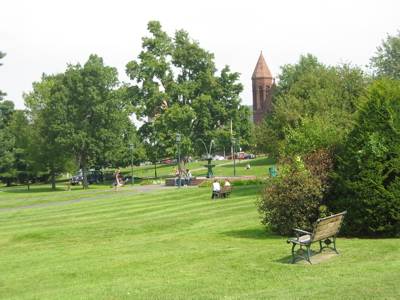What I am hoping to do is to keep an objective (?) running commentary here on the change process now occurring in the teacher education programs at UVM. My reason for doing this is to make my thoughts available to anyone who cares to access them. My purpose is a bit broader. Change is inevitable given the way the Dean has put our problem before us. It has been my experience that blogs can serve as a kind of off-line (halls of Waterman???) venue for those involved to offer commentary. SImple as that. No one may care to jump in. Some might wish to do so. This is a place where a discussion could be mounted that might be of some use. Meetings generally are not venues of reflective engagement. Reflection might happen here in a way that could support the many discussions and decisions that will occur in the coming months.
I’d like to start by simply stating what I think I’m hearing from the Dean.
Fact.
1. We have a budget shortfall in DOE of somewhere between $350l-$400k. She also said half a million dollars but I suspect that was hyperbole.
2. $172k is represented by $ going to support PDS relationships.
3. With an N of 1, she has not heard good things about the PDS relationship.
4. The budget shortfall is primarily the result of unwise budgeting practices that have occurred within the teacher education programs, most notably the elementary and secondary teacher education programs.
5. She directed the Chair to create a plan to address the deficit asap; asap=the AY05-06, 06-07.
6. The Chair created a plan that has the Dean’s backing. If faculty do not create a workable alternative, the default plan goes into effect early March06.
7. The Dean will not be a participant in plan making. She has asked faculty to be the plan makers. She will be the final word on whether new plans will be put into place. This is a modification process not requiring approval within the University course change process.
8. We are to think out of the box.
9. We are to think quality.
10. We are to put UVM on the national map relative to teacher education.
11. We are to keep current numbers of enrolled students while exorcising those elements of current programming that create negative budget pressures.
12. This will be painful. Pain means the loss of non-tenured positions. The first round of pink slips have already been issued to a few faculty whose services will no longer be required.
13. We are to work harder to achieve these desired ends.
14. We are a good faculty, there is much excellence here, she expects us to get the job done.
What am I missing?
I’d like to continue by sharing a few feelings.
It is hard not to feel denigrated by this effort. Listening to the Dean’s perception of what we have, it feels very much like she sees these programs as static, provincial, and greedy. Translated, I guess that means something like we have programs that are in a rut, they serve only regional needs and are not on any national screen of teacher education excellence, and we expect money when we have to hire part time faculty, school based or not, to address program needs. My response to this is pretty simple. I and many others that I know often put in 10 – 12 hour days. Even more. Our programs are not static. They required constant tending and adjustment. Our programs are a unique blend of praxis: university based instruction is intimately woven into field based requirements. We follow our students in the schools to support, critique, and magnify the effects of experiential and reflective work with kids and teachers across the k-12 spectrum. We do not deliver our students to public school personnel to be educated. We accompany and provoke their intellectual journey to become teacher leaders. And we are pretty successful at what we do. How do I know? I know why students leave the program before they enter their professional years. I know why students come to our program from other parts of the University. I see where our students are hired and what they are doing after only a few years of teaching. We are doing what we’ve set out to do and are doing it the best we know how.
For me to head into this time of program change in any kind of sane manner, I have to view what we are about to undertake as a process of bringing closure to current efforts. I need to envision this process as an “end old programs/create new programs” effort. Why? Simple. The equation that requires a double digit reduction of sections while continuing to press for increased numbers of students in the program means a drop in program quality as we currently know it. We cannot continue to deliver what we are doing with that deep a cut and to snip here and snip there in an effort to do it is hypocritical and antithetical to what we believe good teacher education to be. We have to declare victory, get out, and build anew.
What do we build? I’m going to leave that for another time. What are we to become? I going to leave that for another time. I have interesting thoughts about both those questions. I think I’ll leave this commentary with the big question in my mind. It came from a meeting where the Doctoral Advisory Committee was being asked to “think like graduate faculty.” I think the answer appeared as hopes and dreams were stated around the table. The question left me thinking there was a 600 pound gorilla somewhere in the room. Here’s the gorilla…
What does it mean to “think like undergraduate faculty?”
Ponder that.
